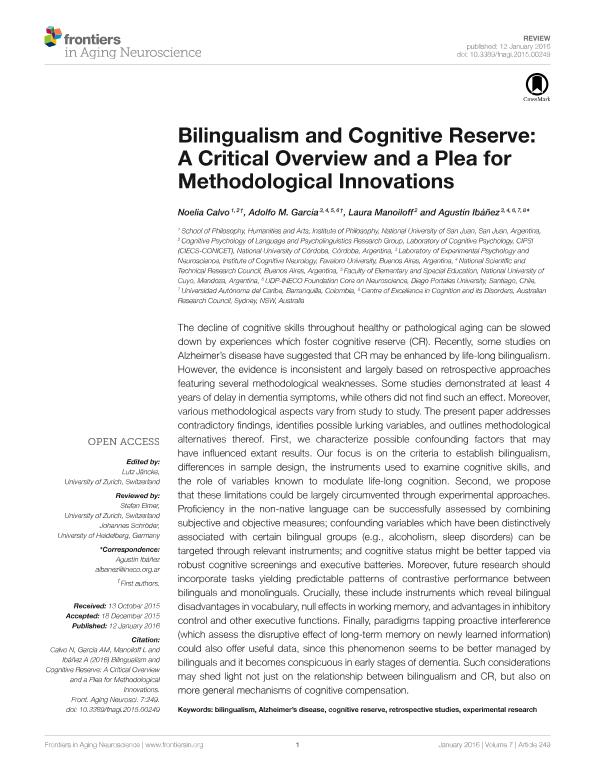Artículo
Bilingualism and cognitive reserve: A critical overview and a plea for methodological innovations
Calvo Garbarino, Noelia Belén ; García, Adolfo Martín
; García, Adolfo Martín ; Manoiloff, Laura Maria Victoria
; Manoiloff, Laura Maria Victoria ; Ibañez, Agustin Mariano
; Ibañez, Agustin Mariano
 ; García, Adolfo Martín
; García, Adolfo Martín ; Manoiloff, Laura Maria Victoria
; Manoiloff, Laura Maria Victoria ; Ibañez, Agustin Mariano
; Ibañez, Agustin Mariano
Fecha de publicación:
01/2016
Editorial:
Frontiers in Bioscience
Revista:
Frontiers in Aging Neuroscience
ISSN:
1663-4365
Idioma:
Inglés
Tipo de recurso:
Artículo publicado
Clasificación temática:
Resumen
The decline of cognitive skills throughout healthy or pathological aging can be slowed down by experiences which foster cognitive reserve (CR). Recently, some studies on Alzheimer's disease have suggested that CR may be enhanced by life-long bilingualism. However, the evidence is inconsistent and largely based on retrospective approaches featuring several methodological weaknesses. Some studies demonstrated at least 4 years of delay in dementia symptoms, while others did not find such an effect. Moreover, various methodological aspects vary from study to study. The present paper addresses contradictory findings, identifies possible lurking variables, and outlines methodological alternatives thereof. First, we characterize possible confounding factors that may have influenced extant results. Our focus is on the criteria to establish bilingualism, differences in sample design, the instruments used to examine cognitive skills, and the role of variables known to modulate life-long cognition. Second, we propose that these limitations could be largely circumvented through experimental approaches. Proficiency in the non-native language can be successfully assessed by combining subjective and objective measures; confounding variables which have been distinctively associated with certain bilingual groups (e.g., alcoholism, sleep disorders) can be targeted through relevant instruments; and cognitive status might be better tapped via robust cognitive screenings and executive batteries. Moreover, future research should incorporate tasks yielding predictable patterns of contrastive performance between bilinguals and monolinguals. Crucially, these include instruments which reveal bilingual disadvantages in vocabulary, null effects in working memory, and advantages in inhibitory control and other executive functions. Finally, paradigms tapping proactive interference (which assess the disruptive effect of long-term memory on newly learned information) could also offer useful data, since this phenomenon seems to be better managed by bilinguals and it becomes conspicuous in early stages of dementia. Such considerations may shed light not just on the relationship between bilingualism and CR, but also on more general mechanisms of cognitive compensation.
Archivos asociados
Licencia
Identificadores
Colecciones
Articulos(SEDE CENTRAL)
Articulos de SEDE CENTRAL
Articulos de SEDE CENTRAL
Citación
Calvo Garbarino, Noelia Belén; García, Adolfo Martín; Manoiloff, Laura Maria Victoria; Ibáñez Barassi, Agustín Mariano; Bilingualism and cognitive reserve: A critical overview and a plea for methodological innovations; Frontiers in Bioscience; Frontiers in Aging Neuroscience; 7; 1-2016; 249-249
Compartir
Altmétricas



